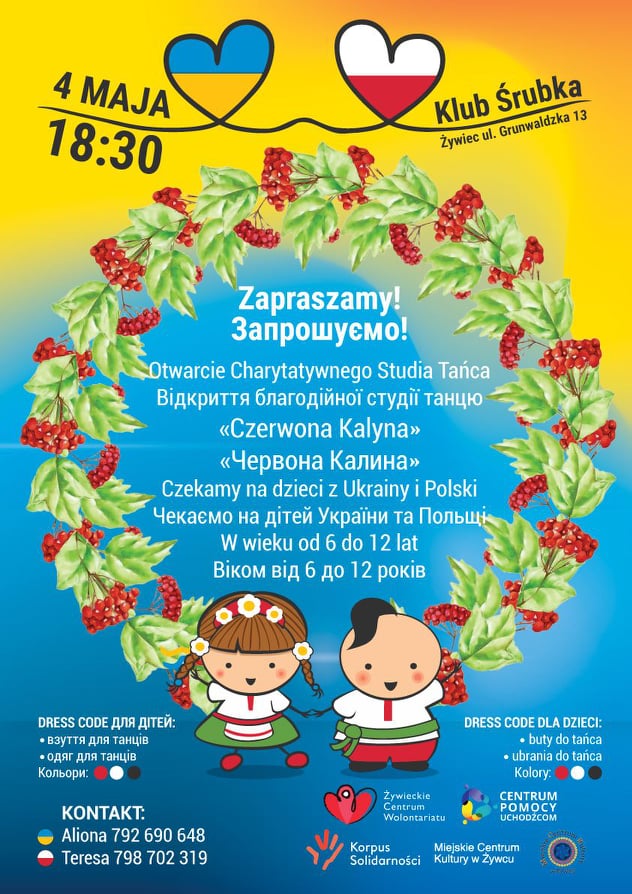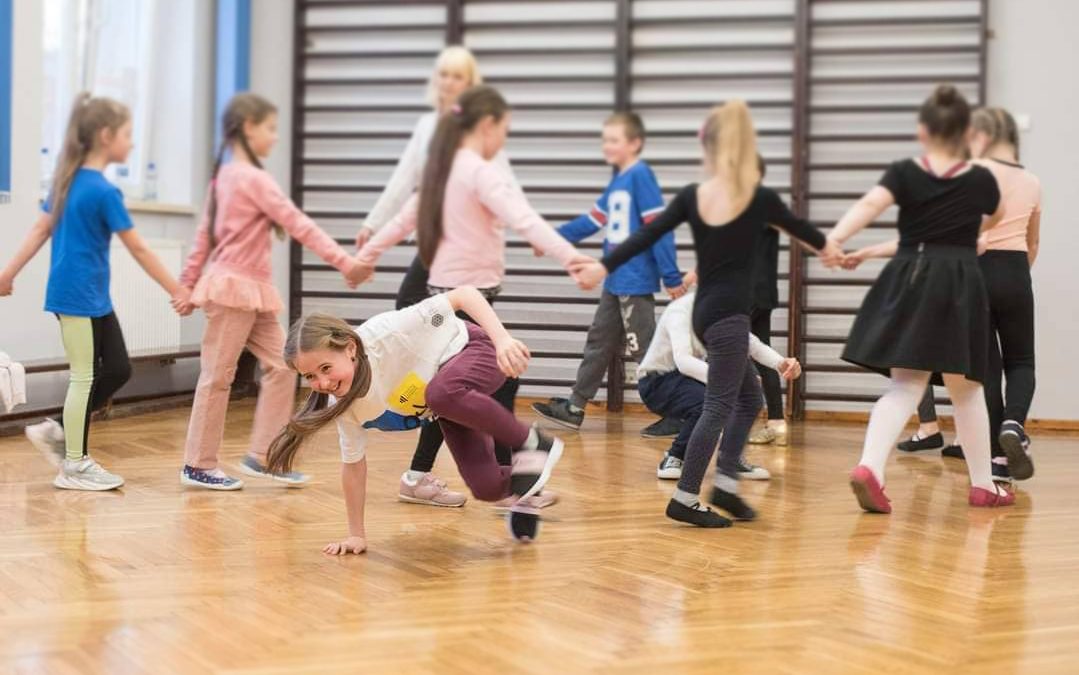By Alicja Ptak
Around 200,000 Ukrainian refugee children have joined Polish schools, with the vast majority of them immediately placed in normal Polish-language classes and thousands preparing to take exams in Polish this month. That approach has faced criticism from experts, who say it places unrealistic and unfair demands on schools and pupils.
Viktoria Cherevulia, a 14-year old Ukrainian, is not yet sure what she wants to be when she grows up. In fact, she was not supposed to have to think about it for at least another year, until the time for choosing a high school would come. Then the war broke out.
In an instant, everything changed for Viktoria. Her mother put her and their mini Yorkshire terrier, Marsa, in a car and drove to Poland, just like over three million other Ukrainians that have fled their country since the Russian invasion began on 24 February.
Viktoria was almost immediately enrolled in a new school with new classmates, new teachers and a new language. And despite having a knack for languages – she already speaks almost fluent English – her inability to speak Polish has cast a shadow over her academic future.
After roughly two months in a new school, she understands Polish (which has many similarities to Ukrainian) very well but does not yet speak or write it with ease. Nevertheless, having been enrolled in eighth grade, she, like other pupils in her class, is expected to take primary school leaving exams next week, mostly in Polish and a year earlier than she would have if she had stayed in the Ukrainian education system.
Viktoria is one of more than 7,100 Ukrainian refugee pupils to have declared that they will take the exams. Although a good score is not a prerequisite for graduating from primary school, it is the basis for recruitment to high school, a crucial step on an academic ladder, which, due to the increased number of students, might be marked this year by even fiercer competition.
“I am a little bit anxious, but I hope it will go well,” Viktoria told Notes from Poland. She is studying hard right now, spending all of her afternoons doing homework for both her new Polish school and her old Ukrainian one, which she sends to her teachers online.
Why are the primary school exams important?
The primary school leaving exam in Poland consists of three parts: a foreign language (usually English), mathematics and Polish. Ukrainian pupils will have to pass identical exams to Polish students.
Certain allowances have been made for them: instructions will be translated into Ukrainian, the time allocated for finishing the exam will be extended, and Ukrainian pupils will be allowed to use dictionaries. Some will be assisted by an interpreter.
But other issues that have raised controversies among teachers and parents – such as the reading list being focused on Polish literature – remain unchanged.
The exams account for half of the 200 points available for admission to high school. The remaining points are awarded for grades, special achievements, the certificate of honour, and volunteer work. Securing spots in Poland’s best high schools is a highly competitive process, in some cases requiring almost spotless records from students.
“It is well known that a low score on the exam will make it impossible to compete with students applying to secondary schools; therefore Ukrainian children with perhaps high levels of intelligence but low communicative skills in Polish are more likely to end up with a place at ‘any old’ secondary school, probably a vocational one,” wrote Zofia Grudzińska, an education expert, in a report for the Batory Foundation.
❌📚Polski system oświaty nie jest dobrze przygotowany na przyjmowanie w szkolne progi cudzoziemców.
Na pytanie "Jaka powinna być polityka edukacyjna wobec uchodźców z Ukrainy?" odpowiedzi szuka Zofia Grudzińska w najnowszej analizie ⤵️https://t.co/EDeirIvgei pic.twitter.com/wQ9Vv8jz3M
— Fundacja Batorego (@BatoryFundacja) May 5, 2022
In an interview with Notes from Poland, Grudzińska added that she is afraid the solutions adopted by the Polish authorities will stifle the potential of young refugees.
According to several primary schools in Warsaw, that is a sentiment shared by some Ukrainian parents, who withdrew their children from Polish schools precisely because of concerns about, among other things, the eighth-grade exam.
Assimilation, integration, Polonisation?
The education ministry, however, sees the current approach as necessary. In a statement to Notes from Poland, the ministry said that recruitment to secondary and tertiary education is based on the principle of equal and universal access.
“The solution – in the situation resulting from the influx of refugees – should therefore not be sought in the creation of special entry conditions, but in helping students to pass the necessary exams and overcome entry barriers in the shortest possible time,” said the ministry.
“Admission requirements are set not to be a barrier, but to ensure that the student who overcomes them has the necessary competencies (including language) to enter the next stage of education and to cope with the demands of that stage.”
But some experts say this approach is unrealistic and unfair given the extraordinary circumstances thousands of Ukrainian students found themselves in.
Across Poland, around 200,000 Ukrainian pupils have signed up for public schools since Russia’s invasion. Given that there are an estimated 700,000 school-age refugees in the country, this indicates that the majority of parents have decided that their children should continue learning in Ukrainian online, or simply not attend school at all for the time being.
Among those who do attend Polish schools, in theory, they have two options: to enrol in normal Polish classes or to attend special preparatory classes in order to learn Polish and integrate into the system.
However, in practice, the second option, though advocated by education experts as the most sensible option for students who might stay in Poland for longer, is usually not possible for schools that are already overstretched, with record levels of teacher vacancies long before the current crisis.
Instead, the vast majority of new Ukrainian pupils have been crammed into existing classes, usually without being able to speak Polish at the start. Poland has therefore chosen the path of assimilation instead of the more preferable integration, says Grudzińska.
In her opinion, the Polish government should help organise Ukrainian schools-in-exile so that parents and children have an authentic choice regarding their education. But Poland’s education minister, Przemysław Czarnek, has remained opposed to the idea, pointing to a lack of resources.
Some, however, accuse Polish authorities of seeking to “Polonise” young Ukrainians – a term that strikes a nerve in Poland’s national subconscious and evokes the memory of “Germanisation” and “Russification”, under which Poland’s former occupiers sought to deprive Polish children of their language and culture.
Czarnek has pushed back against these accusations. “There is no denationalisation of Ukrainian children happening in Poland. Our aim is to take care of them while they are in our country by force,” he said in March.
W czasie 2 wojny światowej rząd Nowej Zelandii zaprosił 700 polskich sierot i sfinansował wykształcenie ich w polskiej tożsamości, co do dzisiaj pamiętamy z wdzięcznością. A ten głąb chce dzieci Ukraińców walczących o wolność ekspresowo polonizować.
Boże, co za wstyd. https://t.co/D1rSBp3ImW— Radosław Sikorski MEP 🇵🇱🇪🇺 (@sikorskiradek) May 5, 2022
What can be done?
The difficulties faced by new Ukrainian pupils are also the result of broader and longer-standing problems in Poland’s under-resourced education system, which has been compounded by two years of the pandemic.
Teachers say they feel they have been left without adequate help and tools to deal with the influx of new students, many of whom did not speak Polish.
“We were thrown in at the deep end overnight,” says Wiktoria Kowalkowska, 25, a primary school teacher in Tczew, who saw her class joined by four new Ukrainian boys. In addition to teaching early childhood education, since February she has also started teaching Polish as a foreign language, something she has not been trained for.
Kowalkowska feels the ministry should have provided educational materials in Ukrainian in the early days of the war. She also says the government should allow the hiring of additional help, possibly Ukrainian teachers, who would allow communication and classes to go more smoothly.
“There was no help from the ministry – they didn’t send anything even to occupy these students with something, they merely put them in Polish schools,” Kowalkowska told Notes from Poland.
She adds that she feels as if the minister, who had been accused of politicising the Polish education system even before the crisis, has failed to address the most pressing issues, focusing instead on increasing central control over teachers and headteachers.
“He was concerned with everything around, but not with what needed to be addressed,” she says.
Loneliness
One solution to the problem would be schools being set up in Poland teaching the Ukrainian curriculum, the first of which have already begun to appear. However, these are small-scale, privately funded initiatives that would be difficult to scale up.
Anna Martyniuk, a 35-year-old English teacher from Ukraine, says that a real school with challenging and interesting classes is necessary for Ukrainian kids not only to continue their education after fleeing from Russia’s invasion but also to harness their energy, give them a sense of normality and allow them to make bonds.
In order to do this, she started an initiative in a small town near Bielsko-Biała in southern Poland, offering free dance classes and English classes. So far 30 kids have enrolled, but she hopes more will join soon. She has also invited Polish children to join.

“It will be good to mix two cultures, two systems,” says Martyniuk, herself a mother of two young children who had just joined Polish schools. Her nine-year-old daughter already speaks Polish, but her seven-year-old son is struggling to settle in the new reality.
“He is the only Ukrainian kid in his class. He is very friendly and communicative… but right now it is a problem for him because he wants to make new friends and he can’t,” she explains.
Viktoria, the 14-year-old, also spoke about the loneliness she has had to deal with since she left, leaving her friends and family in the western Ukrainian city of Khmelnytskyi. She still communicates with them daily, but being far away in this new country, she feels alone.
Nevertheless, she and her mother have decided they will stay in Poland for now, even if the war ends, as finishing high school with a European diploma might help to achieve her dream of an international career.
At the mock exams, which she took recently, she says she aced English, her favourite subject. As for the rest – she is working hard to catch up.
Main image credit: Anna Martyniuk

Alicja Ptak is deputy editor-in-chief of Notes from Poland and a multimedia journalist. She has written for Clean Energy Wire and The Times, and she hosts her own podcast, The Warsaw Wire, on Poland’s economy and energy sector. She previously worked for Reuters.




















